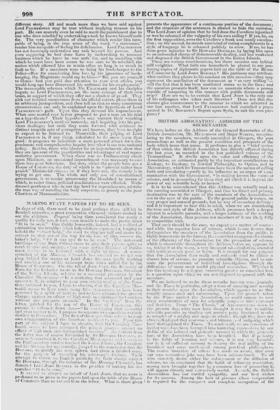:MAKING STATE PAPERS FIT TO BE SEEN.
IN days of old, there used to be (and perhaps there still is) in Scottish nurseries, a great commotion whenever visiters desired to see the children. Prupree! being then considered too costly a quality for daily use, it took some trouble to make the pretty dears " fit to be seen." One thrifty housewife, indeed, had a teethed of' minimizing the trouble : when ladystisiters eepressed a longing to behold the " sweet baby," she used to ring her bell and desire the servant to step across the way for the leue of .Mrs. — the baker's baby, " for it was aye fit to be seen." The untoward bantlings of our State Otlices seem to give their parents quite as much useable and ansiet:e e7.c mmsmae pet mg Member of Parlia-
ment dtedres to be t1 Lr I a sisht of them. A corre- spondent of the .1fore;es 2.''eseis,'s hes enabled us to get one peep behind the Scenes at Lord JOHN buaily washing- and combing one of his unkempt brats \viten called fia. by the House of Commons. On the 4th of Jene Ie40, the S.a.e.:Aar:: of
State for the Colonies wrote to Sir Ilowaao GOVertiOr of the Ionian flands, rattive to a memorial presented by the Chevalier MVSTON.11H--" In emnsidering that memorial and your answer to it, in relation to your own adie'n1 tle.! flume-
tons assigned to you, I have to observe, t! et t2 ( -2.Ius- toxidi sculls to have made meny fid,e ,..t.eeeee:ee e,ve heen governed by a spirit of faetien, and to Lem.: 1 tJ.• ,re..est
charges ngdinst an officer high rank mei !
without any adequate :trot:ads.- in the " ee!ee m tlme
letter, printed for the use of the Home- . title passage is softened down into—" In comi emorial and your meeo,er to it, I propose to separate le., yme, e:direly distinct in tl:emselves. The first of these rpo• • to your
own adnur.i,tration of the functions to‘sigee , -:;')r: this part of the subject I have to observe, that the Ce‘ei:e.e .-Aius- toxidi see:as. to have advanced the grimee:,1 tharei., me -,2-t an officer of high rank and distinguished serv:ce." ,e:t feet leen the letter was of course forwarded by Sir theemo, Del soon as he received it, to the Cavaliere
the Parliste;.ntery version reached the Ionian the Cavaiiere and his not unnaturally, jumped to the conclo.ion that Sir
How.isto, to gratify his own spleen, had given a fidsilied copy, for the purp,se of wounding his adversary's f'eelings. Their attempt to obtain an Engliim publicity fir their charge against Sir HowAtio, through the columns of the Morning Cloronior:, has detected Lord Jolts Ressem. in the prectice of making his de- spatchea " fit to he Seen.- It Car:E,,t be hilUffed on behalf of' Lord Jones, that no more is professed to be given in the papers laid upon the table of' the House of Commons than an extract from the letter. What is there given presents the appearance of a continuous portion of the document; and the structure of the sentences is altered to hide the omission. Was Lord JOHN of opinion that he had done the Cavaliere injustice? or was he ashamed of the vulgarity of his own railing? If yes, he, on the first supposition, owes the Cavaliere a frank and manly exculpa- tion; on the second, he stands convicted of' rating complainants in a style of language he is ashamed publicly- to avow. If no, he has done gross injustice to Sir HowAno DOUGLAS, by laying hint open to an unfounded charge of dishonourable dealing, and has weakened and disgraced the British Government in the Ionian Islands.
These are serious considerations, but there remains one behind still weightier. What litith can henceforth be placed in any pro- fessing copies of diplomatic papers laid on the table of the House of Commons by Lord JonN Russnr.r.? His partisans may attribute what motives they please to his conduct on this occasion—they may represent the mutilation of the document as " so very trillitig"— still the fact that it has been mutilated stares us in the (lice; and, the question presents itself, how can we ascertain where a person capable of tampering in this manner with public documents will stop? How are we to be certain that Lord JOHN is the only one of his colleagues who takes such liberties? Does not this dis- closure give countenance to the rumour to which we adverted in our last number, that Lord PALMERSTON had curtailed a paper quoted in Dr. Bowanso's Report upon Syria, to suit his own pur- poses?


























 Previous page
Previous page